Women for and against Trump discuss women’s rights in a post-Obama America
The women who descended on Washington, DC, this weekend could be categorized by their headwear: red baseball caps versus knit pink hats shaped like cat ears. For the former, the main event was Friday’s inauguration of US president Donald Trump, for the latter, it was the Women’s March to protest for women’s rights and against the new president.
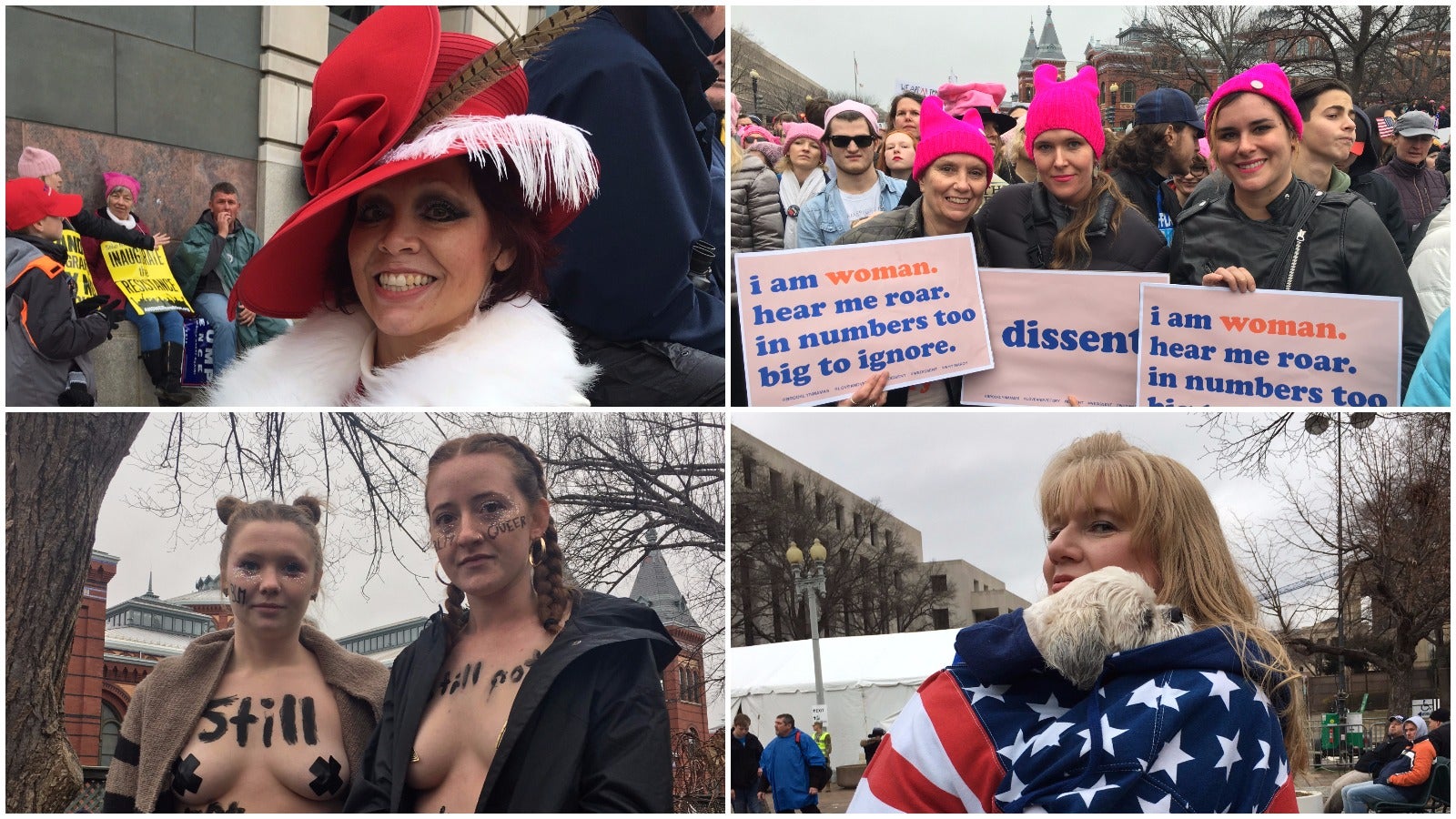

The women who descended on Washington, DC, this weekend could be categorized by their headwear: red baseball caps versus knit pink hats shaped like cat ears. For the former, the main event was Friday’s inauguration of US president Donald Trump, for the latter, it was the Women’s March to protest for women’s rights and against the new president.
In many ways, the two crowds could not be more different, but, as women living in America in 2017, they do share some similar experiences. To find out more about how their views clashed or agreed, we asked members of the two groups the same three questions:
- Do you think things are better or worse for women than they were roughly a decade ago?
- What’s the most important thing you would like to see change for women in your lifetime?
- What do you think is the main difference between you and women your age at the [Women’s March or Trump inauguration]?
Here’s what we heard:
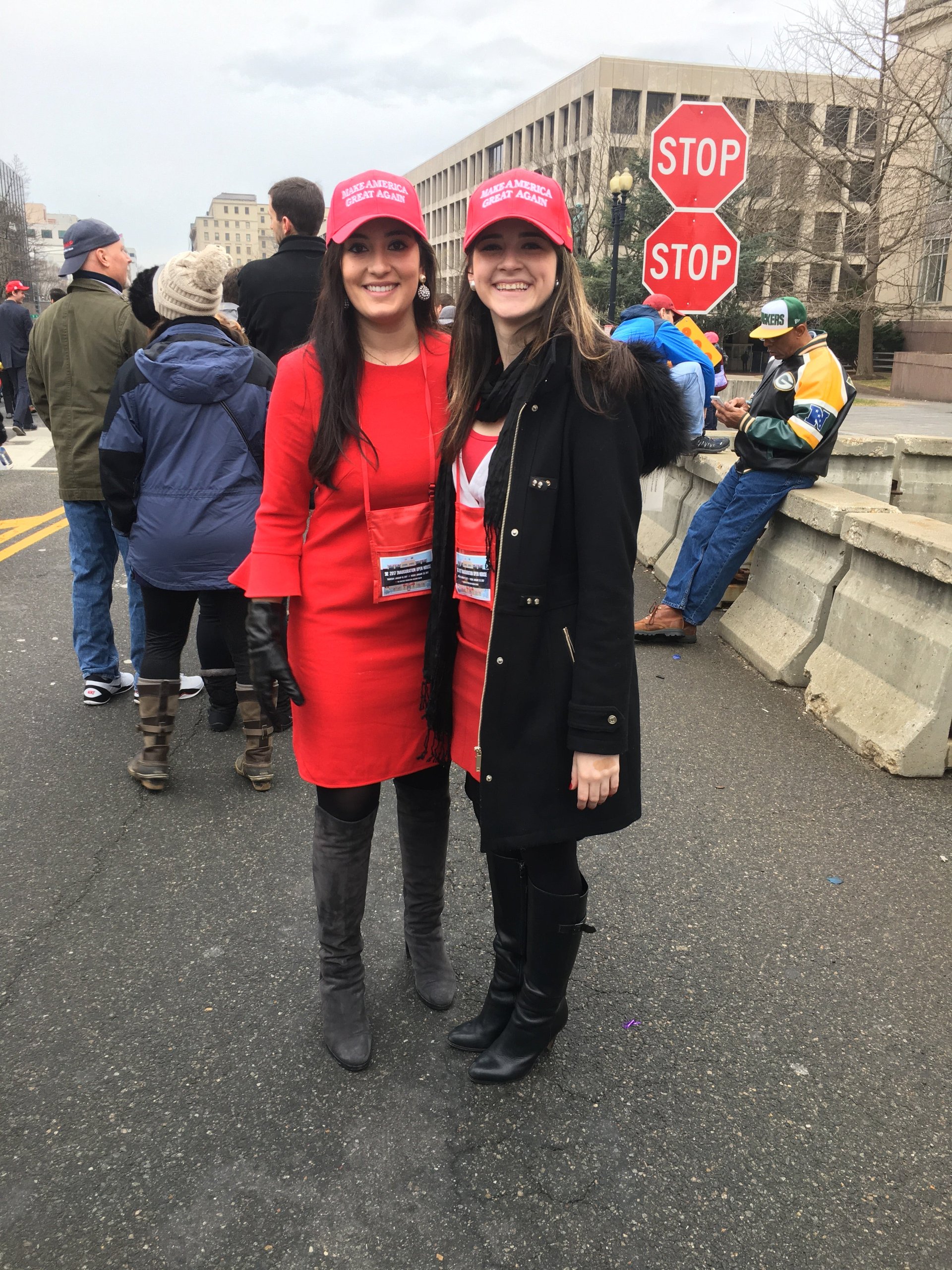
Ginny Montalbano (left), 21, and Lauren Bowman, 22, are both students at the University of Texas.
Bowman, on how things have changed for women: “In terms of economics and security, after the Obama presidency, women are definitely not better. He had failed policies from the very beginning. For instance, minimum wage hurts women the most, because women are more likely to be minimum wage workers, and it takes away flexibility and opportunity and pay.”
Bowman, on the change she would most like to see: “I want to see pro-life women not demonized.”
Montalbano: “I would say similar for young, female conservatives.”
Montalbano, on her differences with Saturday’s marchers: “I think we don’t feel entitled to anything and we respect the peaceful transition of power and democracy.”
Bowman: “We’re willing to give Donald Trump a chance and the marchers tomorrow have already made up their minds, they are not even going to give him a chance to unite.”
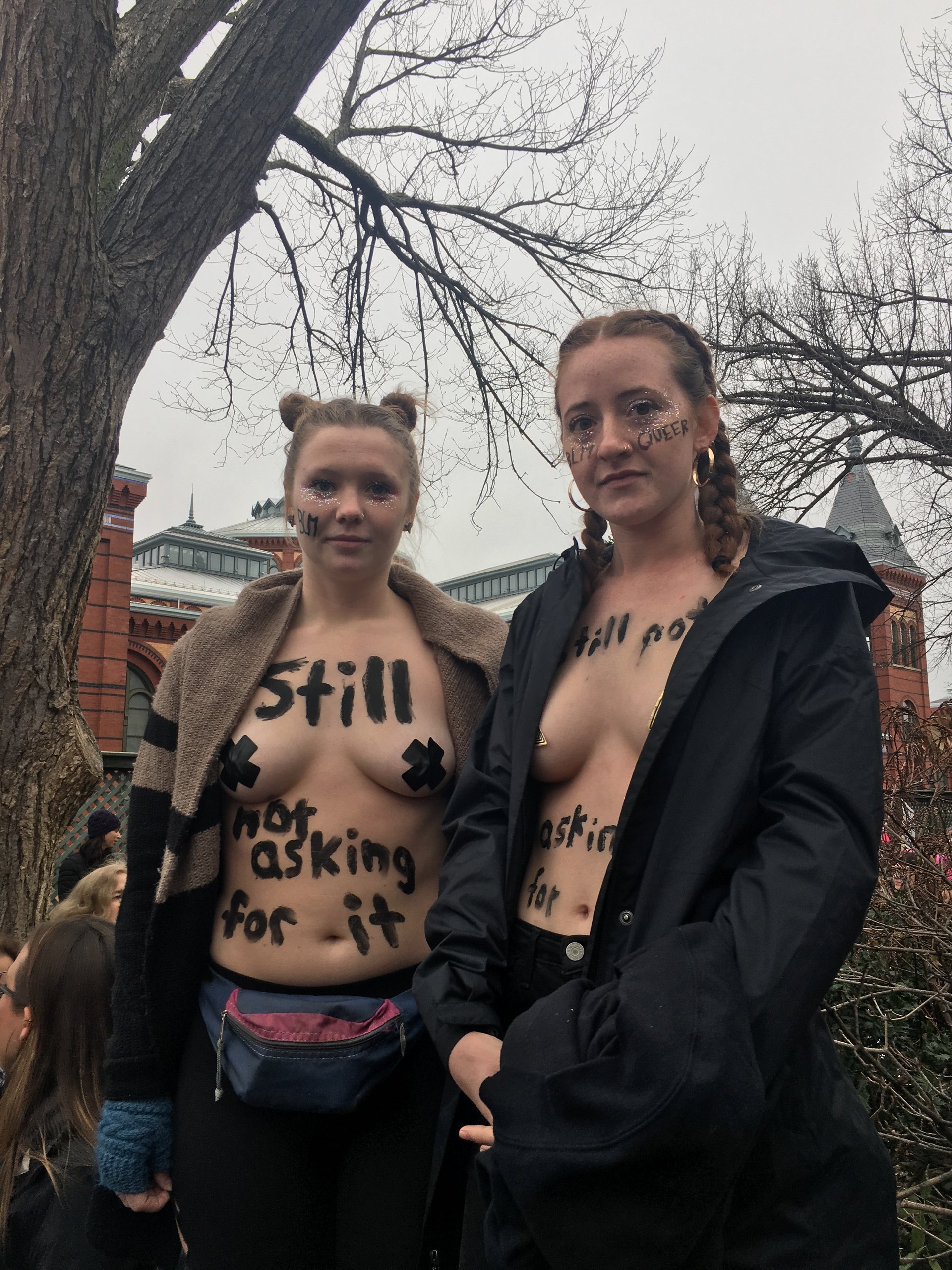
Leah O’Laughlin (left), 23, is a preschool teacher from Minneapolis, Minnesota.
On how things have changed for women: “I don’t think it’s changed. I don’t see any improvements.”
On change she would like to see: “I don’t want people to say ‘Oh I’m disgusted by this because I have a daughter, mother, sister,’ I want them to say ‘They are human beings, and they should be treated with respect.'”
On her differences with Trump supporters at the inauguration: “I think unfortunately they have a lot of internal misogyny; they’ve probably not grown up with families as supportive as mine has been; they’ve probably not been around as diverse a community, so they probably just aren’t aware of the full potential.”
O’Laughlin added that internal misogyny, as she sees it, is when women internalize “the misogyny that we see in the world where women are viewed as sex objects, something to be ogled at” and “where women are told that they are just there to get married, find a man.”
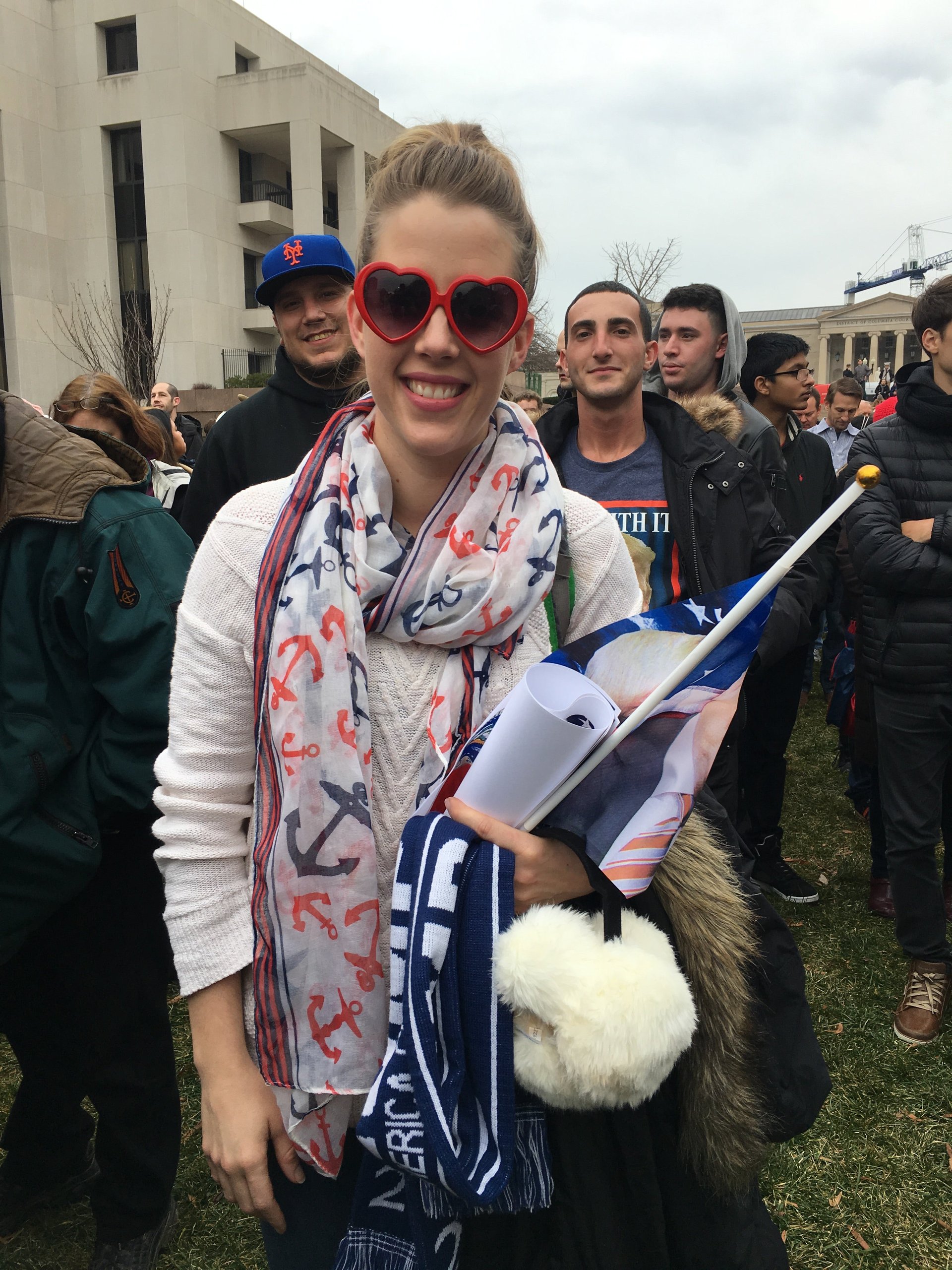
Emma Arnold, 31, is a stay-at-home mom from California.
On how things have changed for women: “It’s kind of ignorant for American women to say we have it worse than anywhere else: we have freedom of speech, we’re working towards gender equality, women’s place in society is much better than in every previous decade…. Women’s suffrage is not an American issue…it’s much more global. American women have it the best, the absolute best.”
Arnold, on her differences with Saturday’s marchers: “I feel like I have many more critical thinking skills than a lot of my demographic does. I’m not just going to hear what the media says and run with it, especially because of my Christian faith…that’s where I put my hope and faith. I look at it with a different filter.”
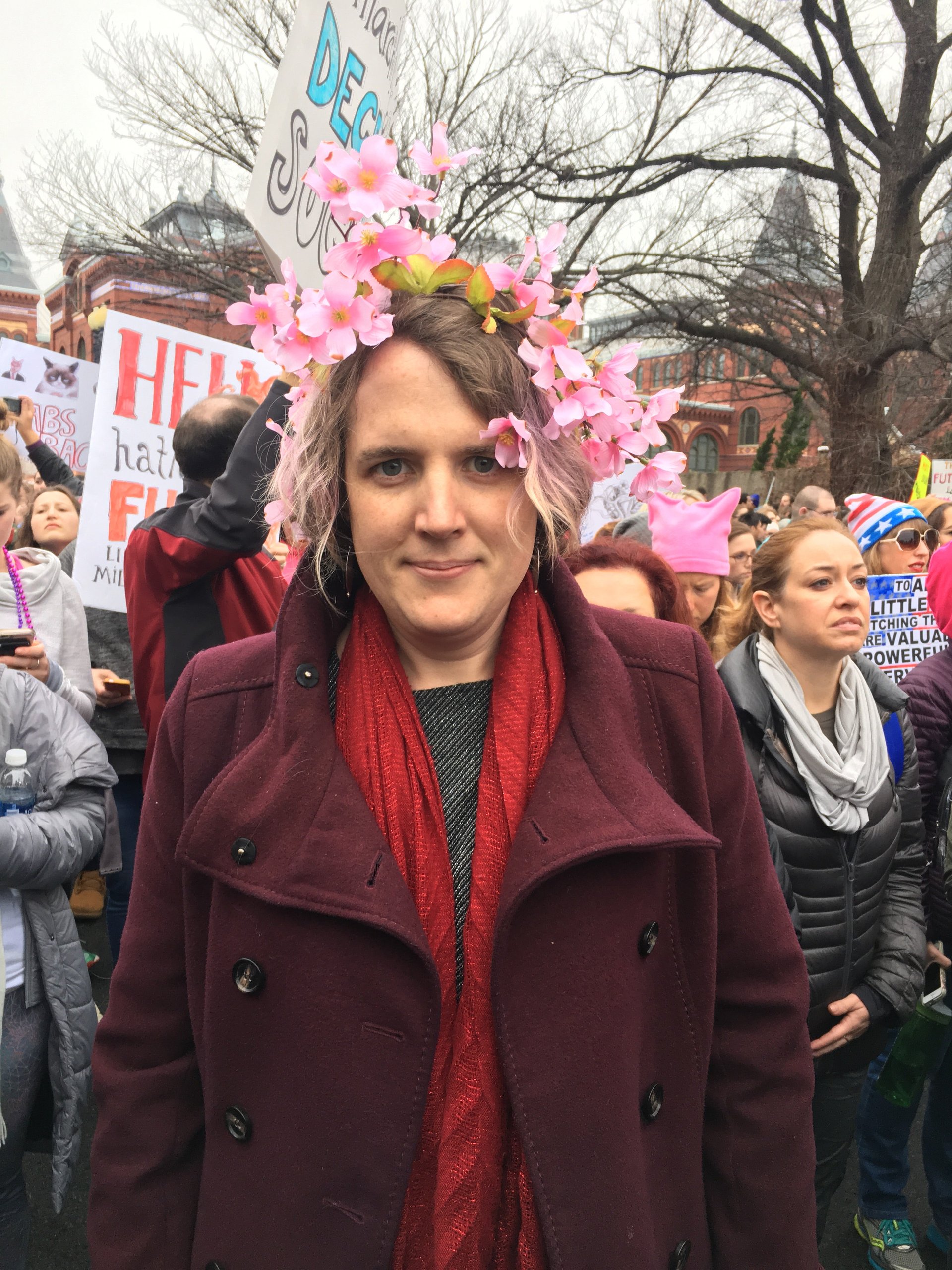
Miriam Suzanne, 34, is from Denver, where she “does art and web development.”
On the one change she would like to see: “To me it’s all about the intersectionality. I want to see black women not being killed, trans women not being killed, I want to see simple things like that. I want to see the end of phobia of femmes.” She explained: “We have a cultural sense that masculine identities and approaches are more real, are better.”
On her differences with Trump supporters at the inauguration: [It’s] probably a lot about where we were brought up, what we grew up listening to. I grew up at these marches, but also all my friends are queer, are immigrants. There’s no way for me to not be out here.”
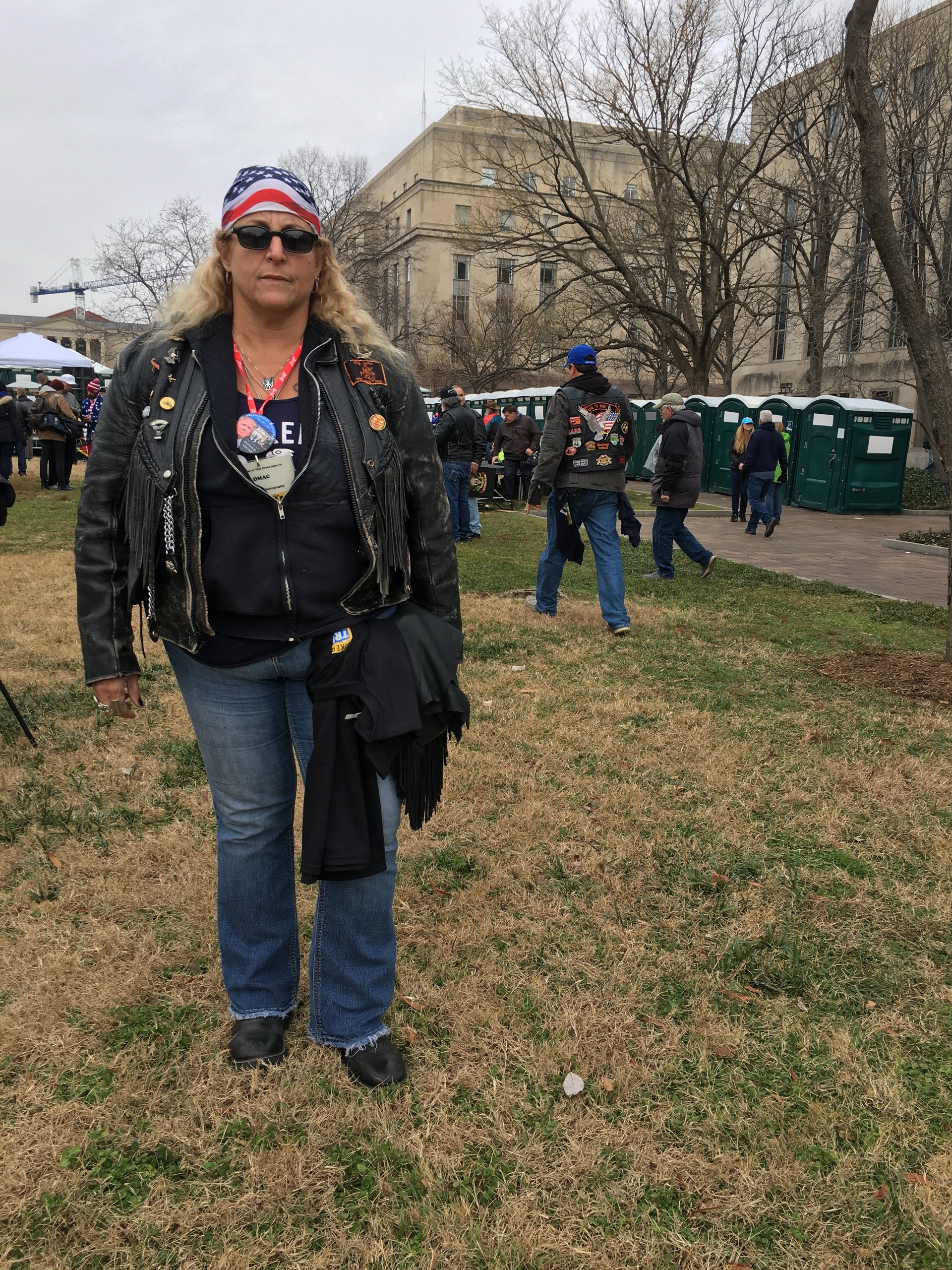
DMAC, is 54, from Tampa, Florida and a photographer and motojournalist. She was covering the inauguration, but was also part of Bikers for Trump.
On how things have changed for women: “I really don’t see any major progress. I still think it’s a man’s world. The one thing I like about Trump is that he sees women and he recognizes their value, and he promotes them. And I’m kind of hoping that the old boys’ club will finally take a nosedive once people see [him as a] role model. [I’m a] woman who has been through a lot, I was the first woman to graduate from her auto body school in the 1980s. You go out to get a job and they want to give you a secretary’s job, that’s not really what you went to school for. I’ve seen that over the years, and finally I realize you just have to blaze your own path.”
On the one change she would like to see: “I would like to see my granddaughters to grow up in a safe world, and for them to have every opportunity that a man has.”
On her differences with women at the Saturday march: “I would rather be on my motorcycle riding somewhere than marching tomorrow. I’m all about showing support, but…it’s more of a downward thing on Trump, a protest kind of thing, and I can’t do that because I really love what he says…I want to see him shake the country. I want to see America go back to what it was when we were growing up the 1960s and 70s when everything was good.”
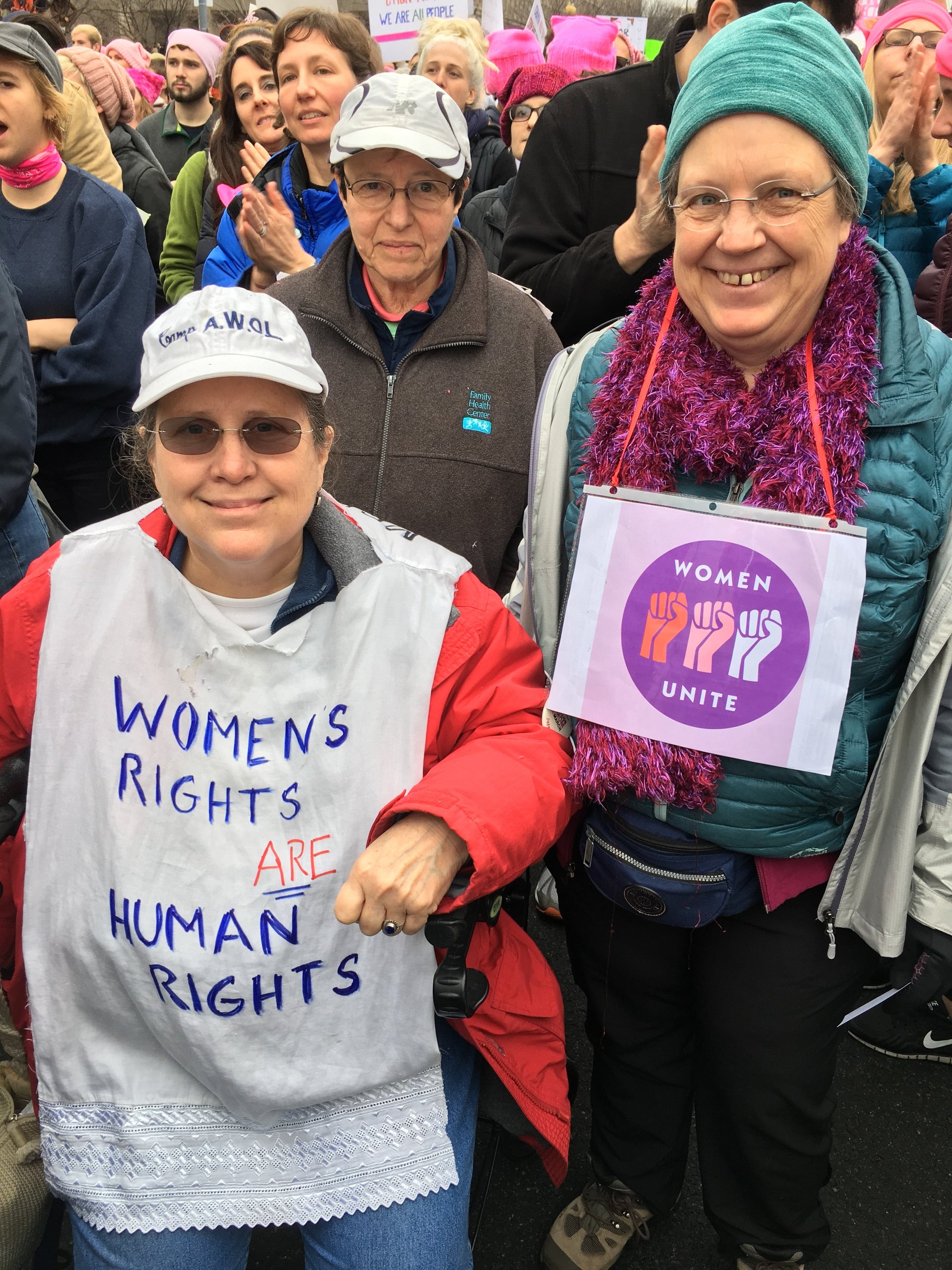
Debo (left), 62 and Rachel, 64, are sisters who live in DC and Massachusetts, respectively. Rachel worked in healthcare, and Debo in special education.
Rachel, on the how things have changed for women: “It’s worse since yesterday.”
Debo, on her differences with Trump supporters at the inauguration: “It’s not good to generalize, but I feel like a lot of them have lived more privileged lives than women in the rest of the world…and here.”
Rachel: “People believe that other’s situation is a result of their choices and aren’t aware of how little choices other people have.”
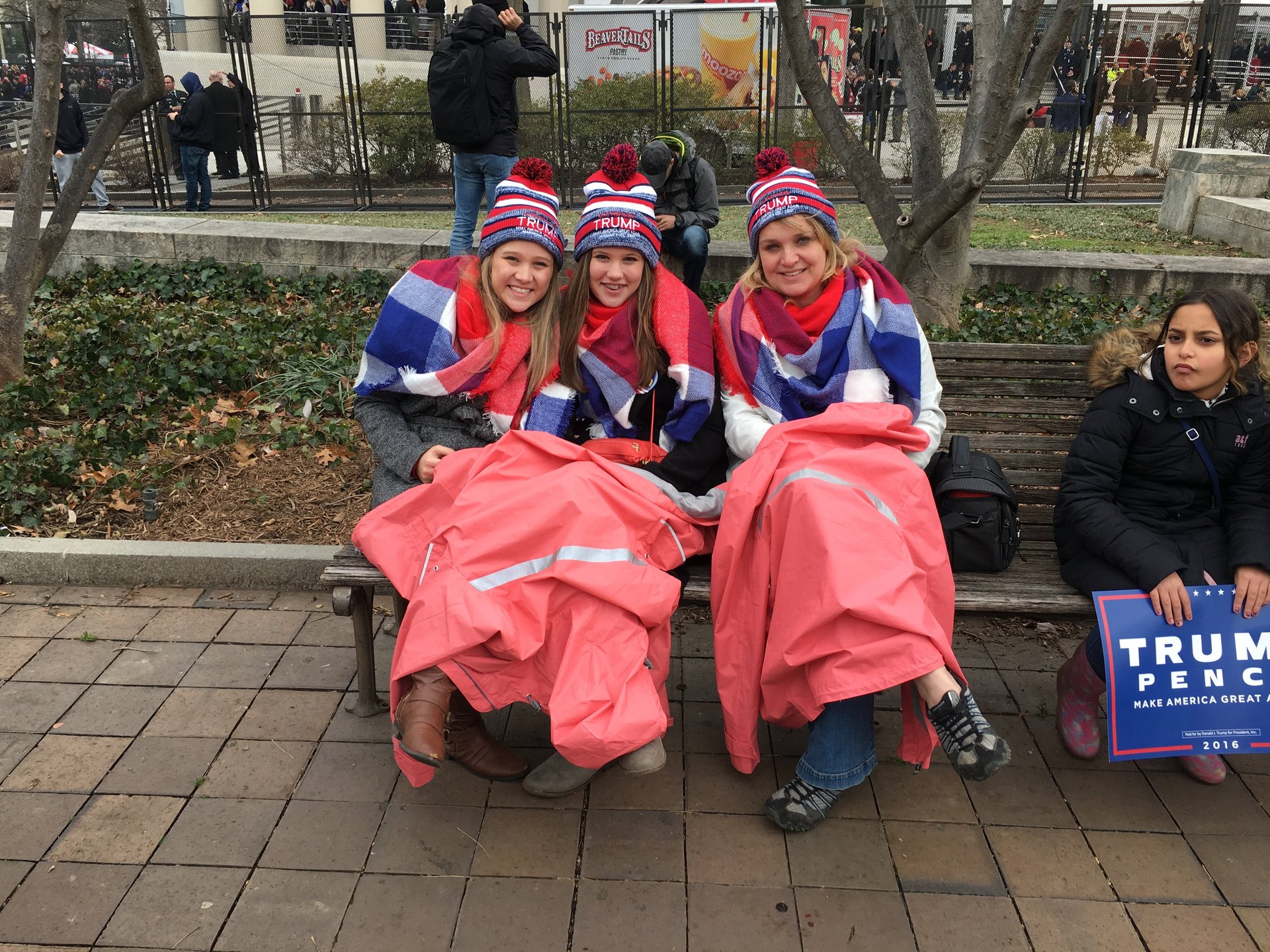
Abbie Hanley (third from the left) is from Maysville, Georgia and is 48. She owns a gun store and a pawn shop with her husband. Inauguration Day was her birthday, and she brought her stepdaughter and her friend.
On how things have changed for women: “Things are better for women, but we still have a long way [to go] for equal pay.”
On the one change she would like to see: “I would like for women to become less of a minority and more mainstream.” She explained that women can get special small business loans and that “people get lots of breaks because they are a minority, I wish women would just get out of that minority status.”
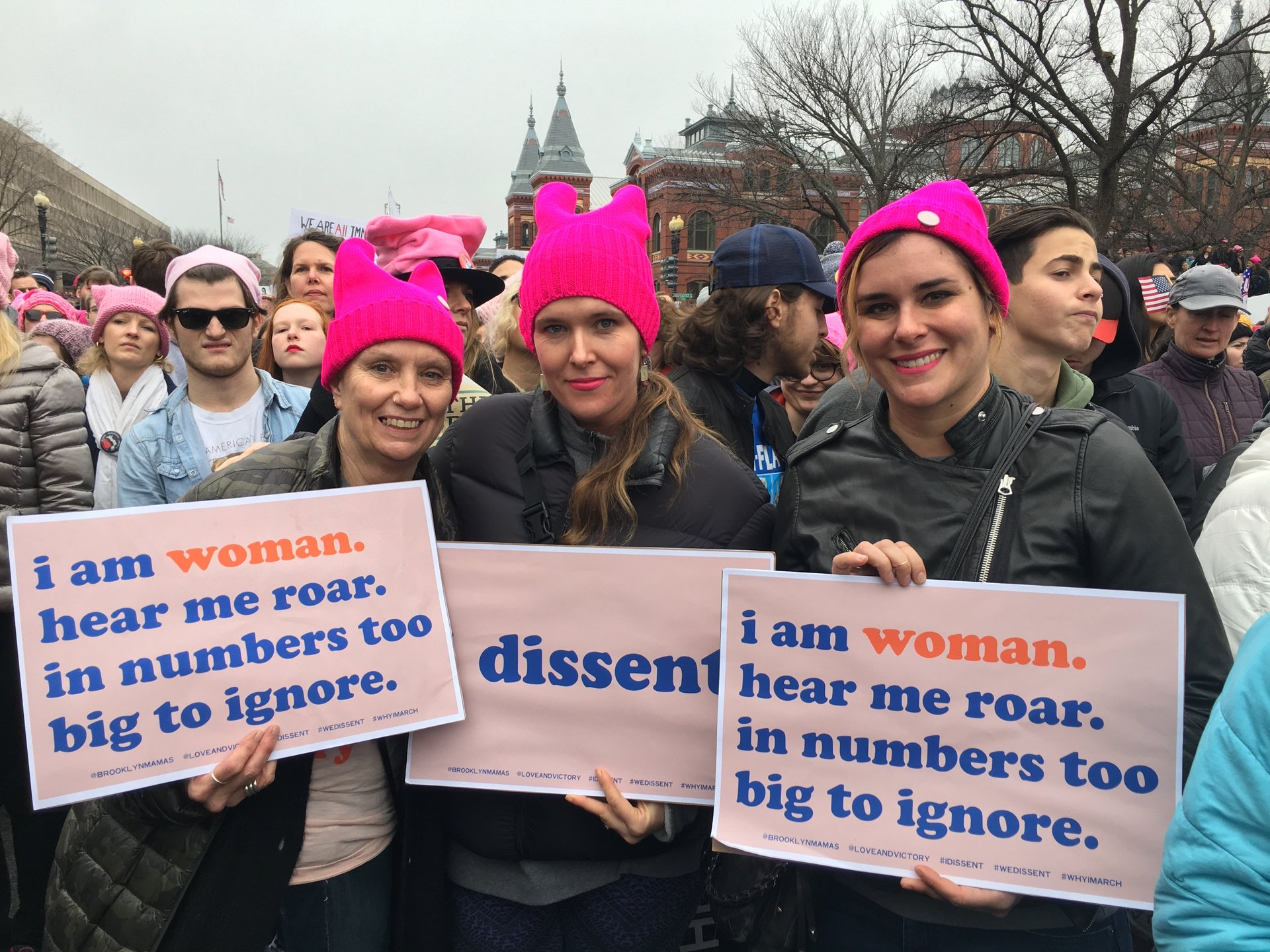
From the left: Sharon Fox is 61 and a teacher. Courtney Winfield is 36 and works for the Department of Education. Meg Moorhouse is 39 and a designer. All are from Brooklyn.
Meg, on how things have changed for women: “I’m going with worse. I felt like there was an atmosphere of ‘we’re equal’ and now people are realizing that this is not the case. I felt like there was a post-feminist attitude of ‘we’re in a good place.'”
Courtney: “I feel like today women are more likely to lose their tangible rights. Our daughters have the potential to grow up with far fewer rights than I had a as a teenager 20 years ago. I think that potential is very concrete and very real now. I feel like she will have fewer options to seek reproductive counsel without permission, she will have fewer options to be covered under her health insurance for birth control.”
Meg, on a change she would like to see: “Pay equity…but also how we’re viewed professionally, as equals.”
Courtney: “I would like to see issues related to women of color be elevated to the forefront.”
Sharon: “I feel like it’s time for us to be respected as human beings, and not just because I have a vagina.”
Courtney, on her differences with Trump supporters at the inauguration: “They have an ability to pick and choose what they hear from the new president, and that they are dangerously fooled into thinking that his words are not going to ultimately going to impact their lives through policy…I hear our president and I take him at this word.”
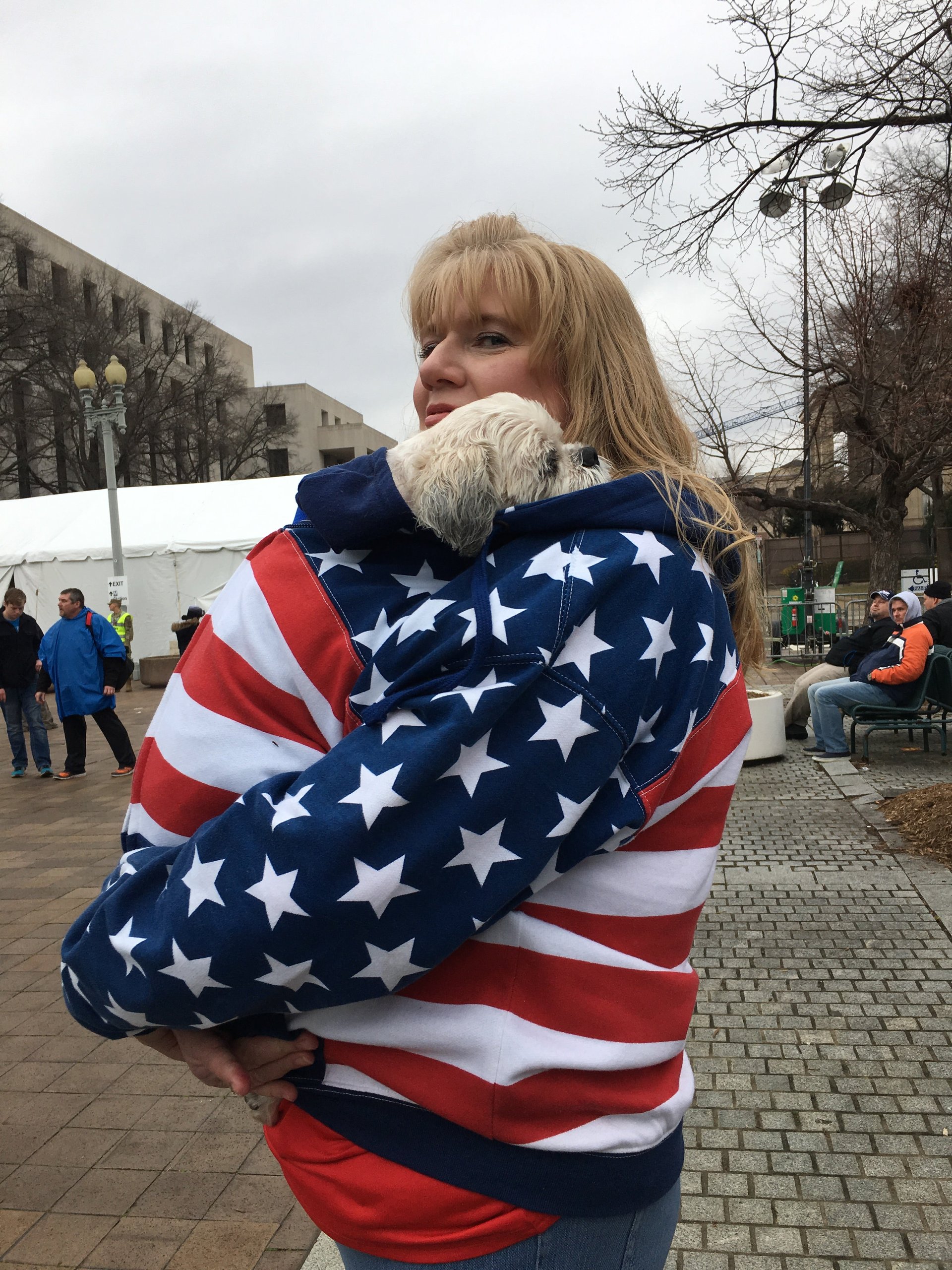
Cheryl Reid, 50, is from New Jersey, and works as a medical biller.
On the one change she would like to see: “I wouldn’t mind seeing a woman president eventually. It wouldn’t be Hillary.”
On her differences with women at Saturday’s march: “It just seems everything is an issue, everybody makes everything an issue, and I just don’t see that things should be like that. I understand when the women came out about the groping [referring to accusations of sexual assault against Donald Trump], I don’t think that’s right, I don’t think that’s a good thing, but there are some things that I feel just have gone on from the beginning of time, they are not gonna change. As far as liberal things, like sexual harassment: People just have to learn that their feelings can get hurt sometimes, that’s just how it rolls.”
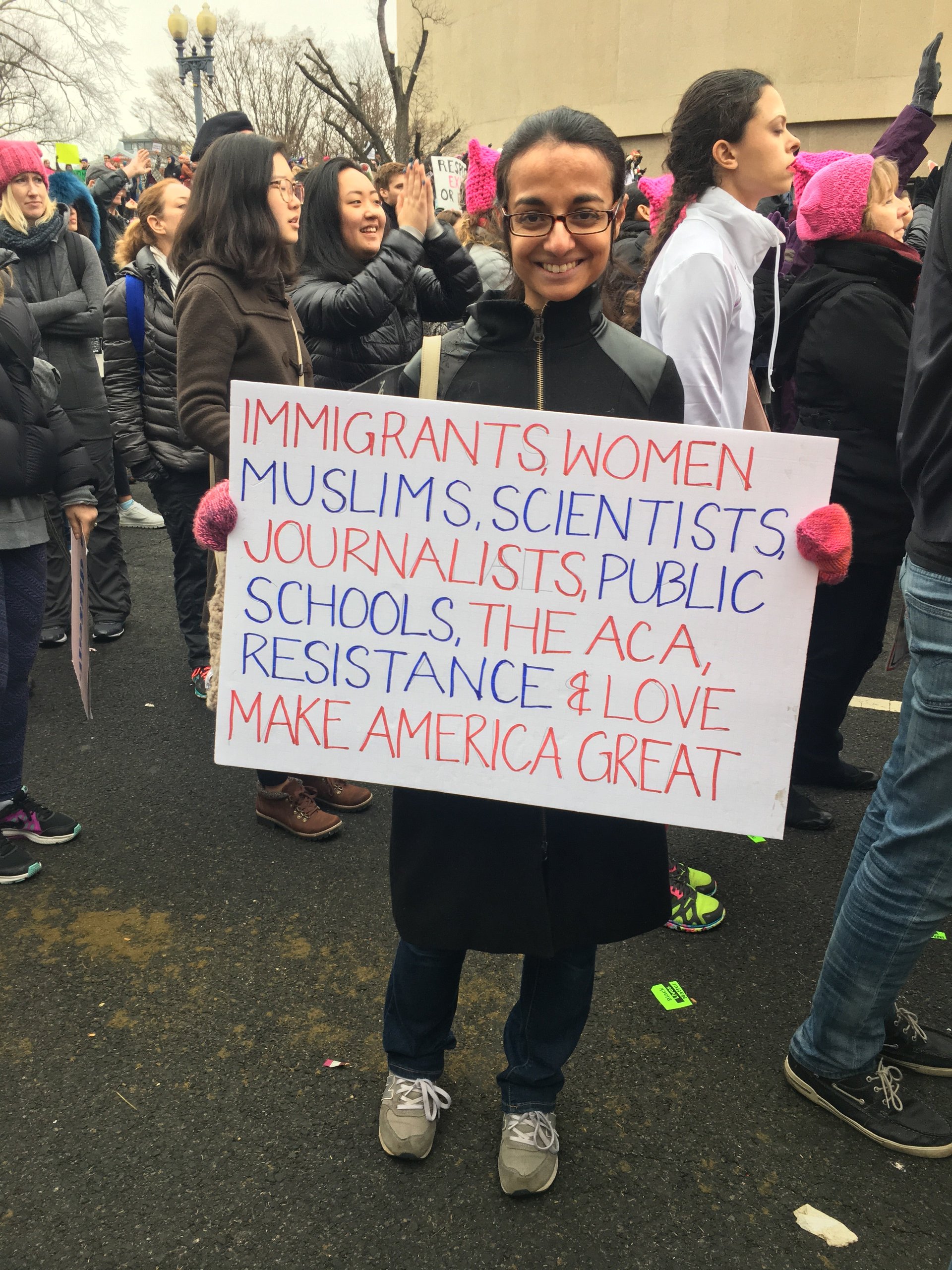
Monisha Cherayil is 33, and a lawyer from Baltimore.
On how things have changed for women: “I think it was an important step forward to have a first woman as a major party candidate running for president. The gender pay gap is still wide, especially for women of color.”
On a change she would like to see: “That every woman can afford to provide housing, healthcare, and food for her family.”
On her differences with Trump supporters at the inauguration: “I don’t personally know any women who supported Donald Trump, so I can’t say on a personal basis. I’m interested to hear…. I believe some may have had some misinformation from conservative media on Donald Trump and Hillary Clinton.”
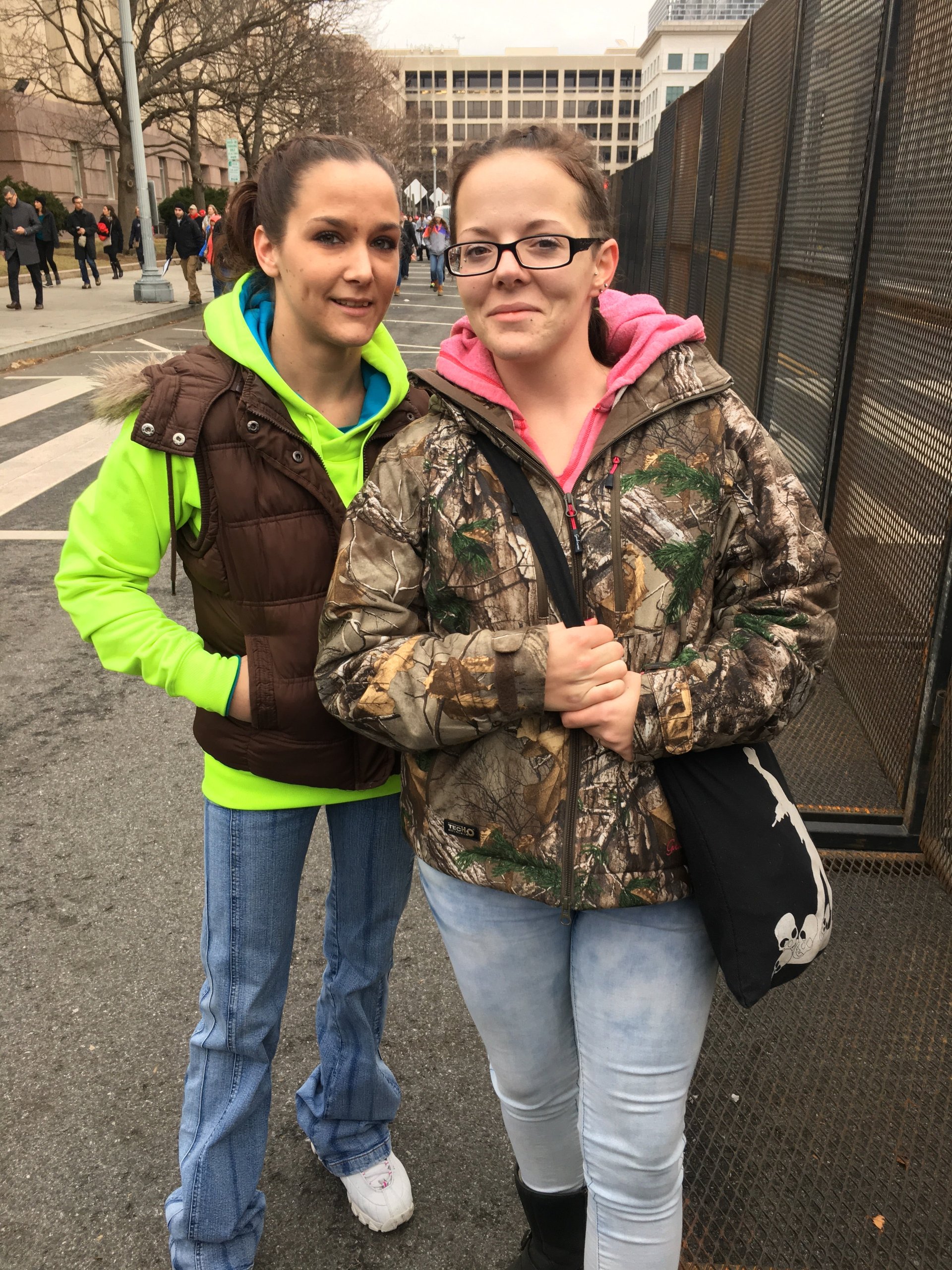
Hannah Dean (right) and Courtney Fogelsonger are 25 and 26 and are from Central Pennsylvania.
Hannah, on a change she would like to see: “I’d like to see a woman president one day. Not Hillary. Or women getting higher position jobs, as men.”
Hannah wasn’t aware of the purpose of the Women’s March, but when asked about the difference between her and Democratic women she said: “They do more research about it. We care obviously, but I’m not doing something to change it, they might be doing a little bit more.”
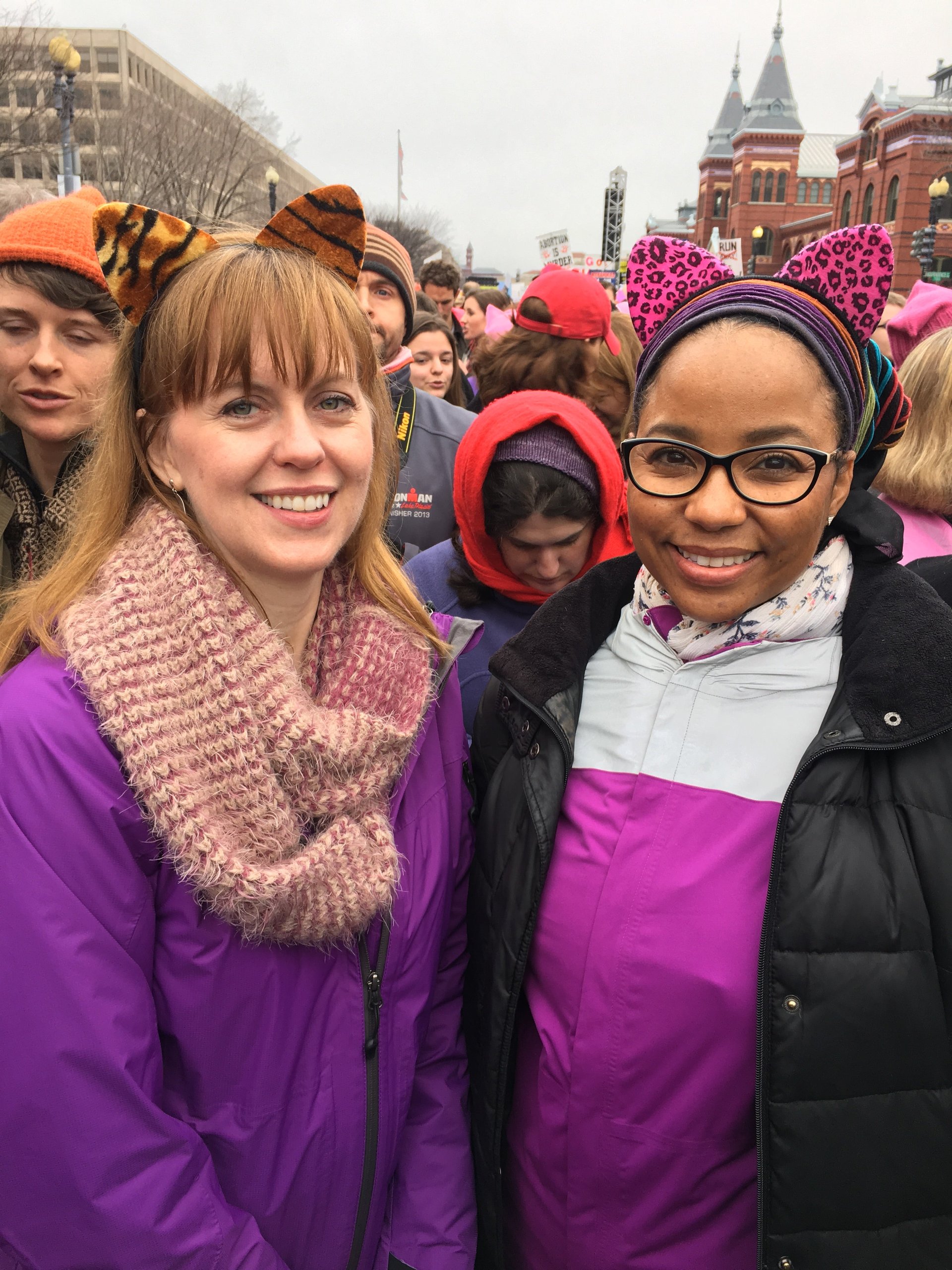
Laura LeForest (left), 41, is in higher education and Heather Hill, 43, is a singer. Both are from New York.
Hill, on the one change she would like to see: “We need to have access to healthcare, it needs to be unfettered, without having to through doorkeepers to get it.”
LeForest, on the differences between her and the Trump supporters at the inauguration: “It’s education, not just straightforward education. We’re from New York, we’re from Manhattan, we’re surrounded by diversity constantly. In communities with a lot of homogenous groups, they just don’t know. But also, people have different problems. We’re the East Coast, we have money, we got a lot of options, and people in middle America don’t.”
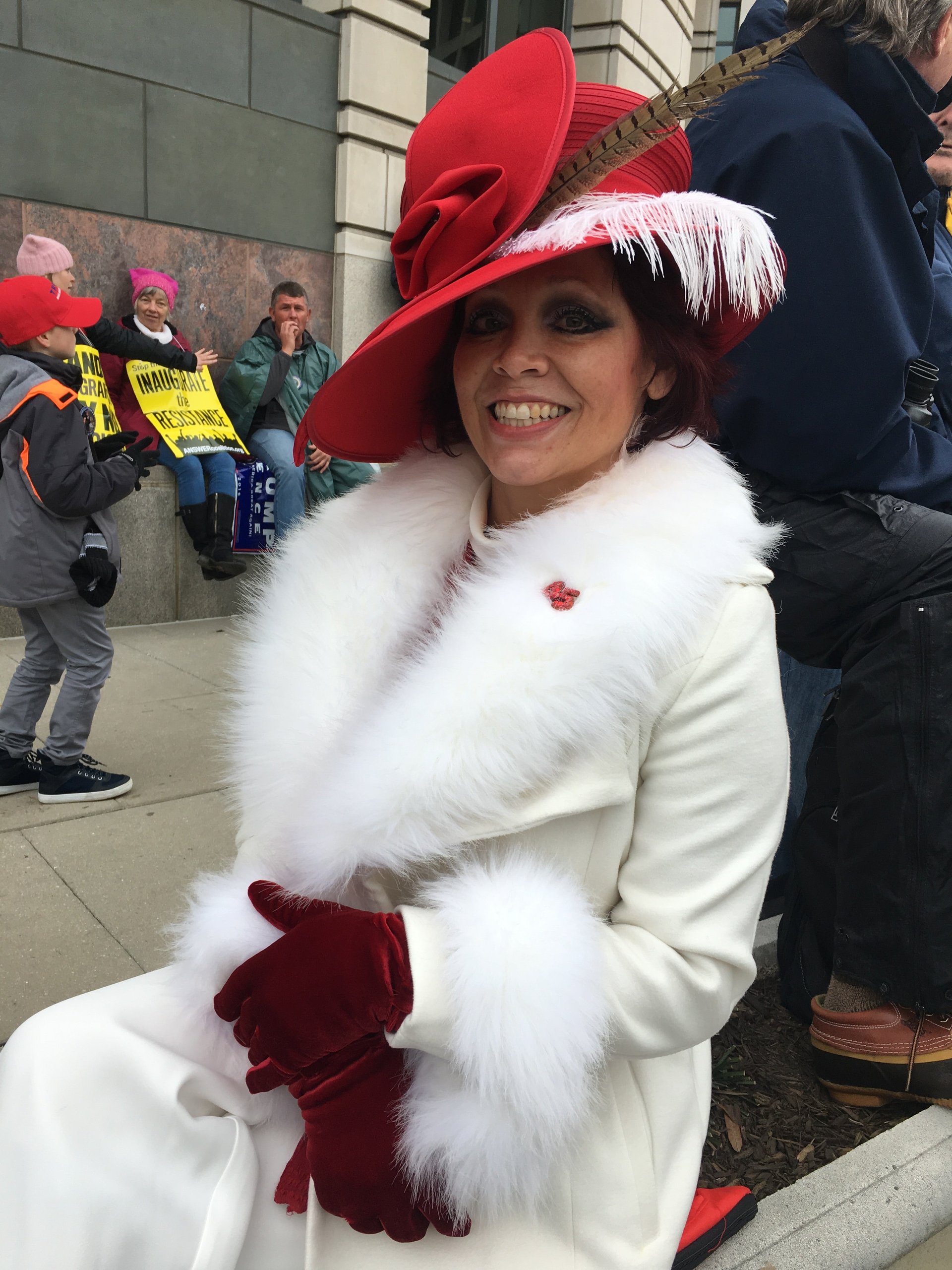
Tita Espiritu, 50, is a cocktail waitress from Las Vegas, Nevada.
On how things have changed for women: “I don’t see a problem, I think everything’s just fine.”
On the one change she would like to see: “What is our problem? What is the women’s movement about? What do you want? Equal pay? We do get equal pay. Women and men are different.”
On the difference between her and the marchers on Saturday: “What is it that you’re fighting for, I don’t understand? You can’t be a lady anymore.” She explained that, to her, being a lady means ”it’s okay to dress up, to wear make up, to be a female. In my opinion I think women get things a little easier than men do, because they are easier to look at. They’ll talk to you more than a man. I think we have a lot of advantages.”
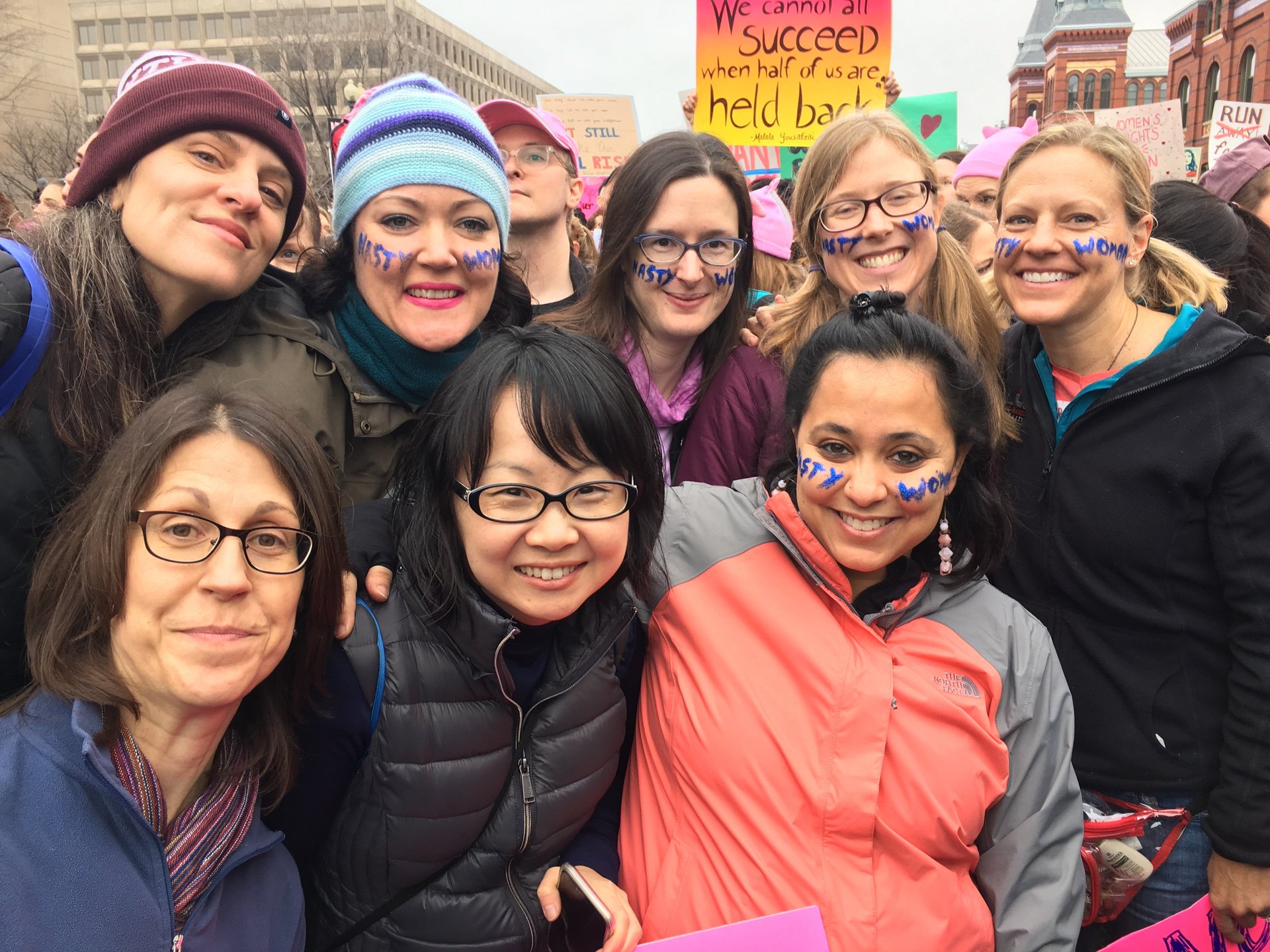
Nadia Cempre (bottom row, right), 36, works in higher education and lives in Charlottesville, Virginia.
On the one change she would like to see: “Maternity rights. Paid leave, more family benefits.”
On the difference between her and Trump supporters attending the inauguration: “Level of education. I don’t think we’re that different, I think we have the same hopes, desires and dreams, but we just have a little bit more of a higher education and an ability to question information.” After a short discussion among her friends, she added: “Maybe not even level, but quality of education.”